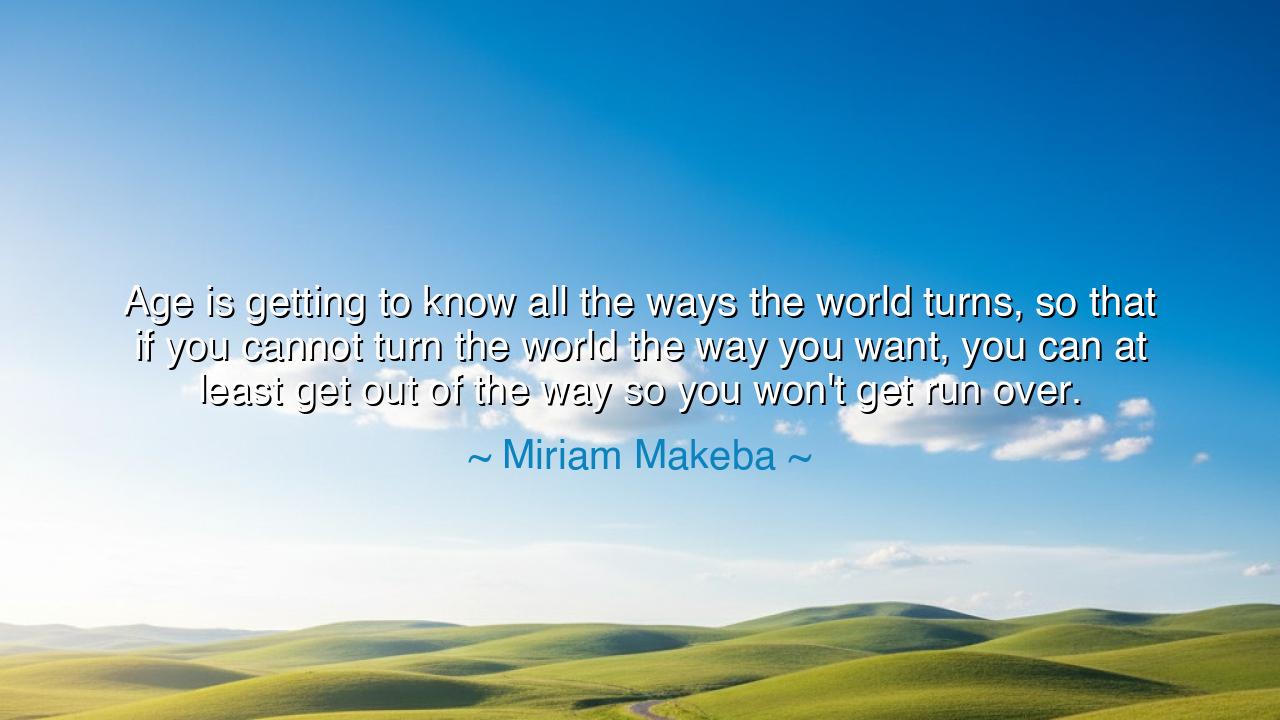
Age is getting to know all the ways the world turns, so that if
Age is getting to know all the ways the world turns, so that if you cannot turn the world the way you want, you can at least get out of the way so you won't get run over.






Hear now, O children of wisdom, the words of Miriam Makeba, a voice who, like the ancient prophets, speaks with clarity and understanding of the ways of the world: "Age is getting to know all the ways the world turns, so that if you cannot turn the world the way you want, you can at least get out of the way so you won't get run over." These words carry a truth that speaks to the very heart of wisdom and experience, for as we age, we do not only accumulate years but we gather understanding—an understanding of the way the world moves, how it shifts and changes, and how to navigate it without being crushed beneath its weight.
From the dawn of time, the ancients have sought to understand the cycles of the world—how the seasons change, how nations rise and fall, how the hearts of men are swayed by their desires and fears. It is in this understanding that wisdom is born. Consider the life of the great Confucius, whose teachings sought to bring order and peace to a world in turmoil. He taught that age was not merely the passing of years, but the gathering of knowledge, a slow and deliberate process of understanding the patterns of life. He spoke not of fighting against the flow of the river, but of learning how to navigate its currents, to find the path that would carry one safely to the other side. In this way, Confucius understood the wisdom of Makeba’s words—true strength comes not in trying to control the world, but in learning when to step aside and allow the world to turn as it will.
Makeba’s reflection is one of quiet resilience, for it acknowledges the inevitability of time’s passage and the limitations that come with it. Youth is often filled with the fire of ambition, the desire to change the world, to shape it according to one’s own vision. The young, full of strength and certainty, believe that they can bend the world to their will, to remake it in their image. Yet, as the years pass, the true lesson of age is not about achieving everything one desires, but about recognizing the forces at play and learning to live within them. For the world will turn whether we wish it or not. The key to surviving its force is to understand when we must act and when we must step aside.
In the great stories of history, there are many examples of leaders who tried to fight against the tides of change, who refused to acknowledge the limits of their power. Take the story of King Darius of Persia, who sought to expand his empire far beyond its natural borders. In his quest for dominance, he ignored the warnings of his advisors and pressed on into regions that were not ready to be conquered. His stubbornness led to his downfall, for the empire could not sustain itself against the vast forces he sought to control. Age, in this case, would have been a teacher, showing him that true power lies not in endless expansion, but in understanding the boundaries of one’s reach and knowing when to let go.
What, then, is the lesson we must learn from Makeba’s wisdom? It is that wisdom comes with the understanding that we are not all-powerful, and that age teaches us to be in harmony with the world as it is, not as we wish it to be. It is easy to be swept up in the rush of youthful idealism, to believe that we must change everything, that we must have everything our way. But true strength lies in accepting the limits of our control and learning to navigate the world as it turns, with grace and humility. When we cannot move the world, we can at least step aside and make space for others, ensuring that we are not crushed by its inevitable march.
Consider also the life of Nelson Mandela, who spent 27 years in prison, not seeking to fight the world with force, but using his time to reflect and understand. He did not come out of prison with a heart bent on vengeance, but with the wisdom to recognize the needs of his people and the forces at play in South Africa. He did not try to control the future, but to guide it, understanding when to take a stand and when to step back. His wisdom was not in his ability to change the world through sheer will, but in his ability to move with the changing currents of time, ensuring that he was not swept away.
Thus, O children of the future, take these teachings to heart: age is not merely the passage of years, but the accumulation of wisdom—an understanding of the world as it turns, of the forces at work, and of how to navigate them with dignity and grace. You need not conquer the world, but you must learn how to live within it, how to adapt when necessary and how to make room for others when the world moves faster than you can follow. Let your wisdom grow with you, and let it teach you to step aside when needed, to avoid being run over by the world’s relentless march. In doing so, you will not only survive but thrive, as you move in harmony with the world’s ever-turning wheel.






AAdministratorAdministrator
Welcome, honored guests. Please leave a comment, we will respond soon